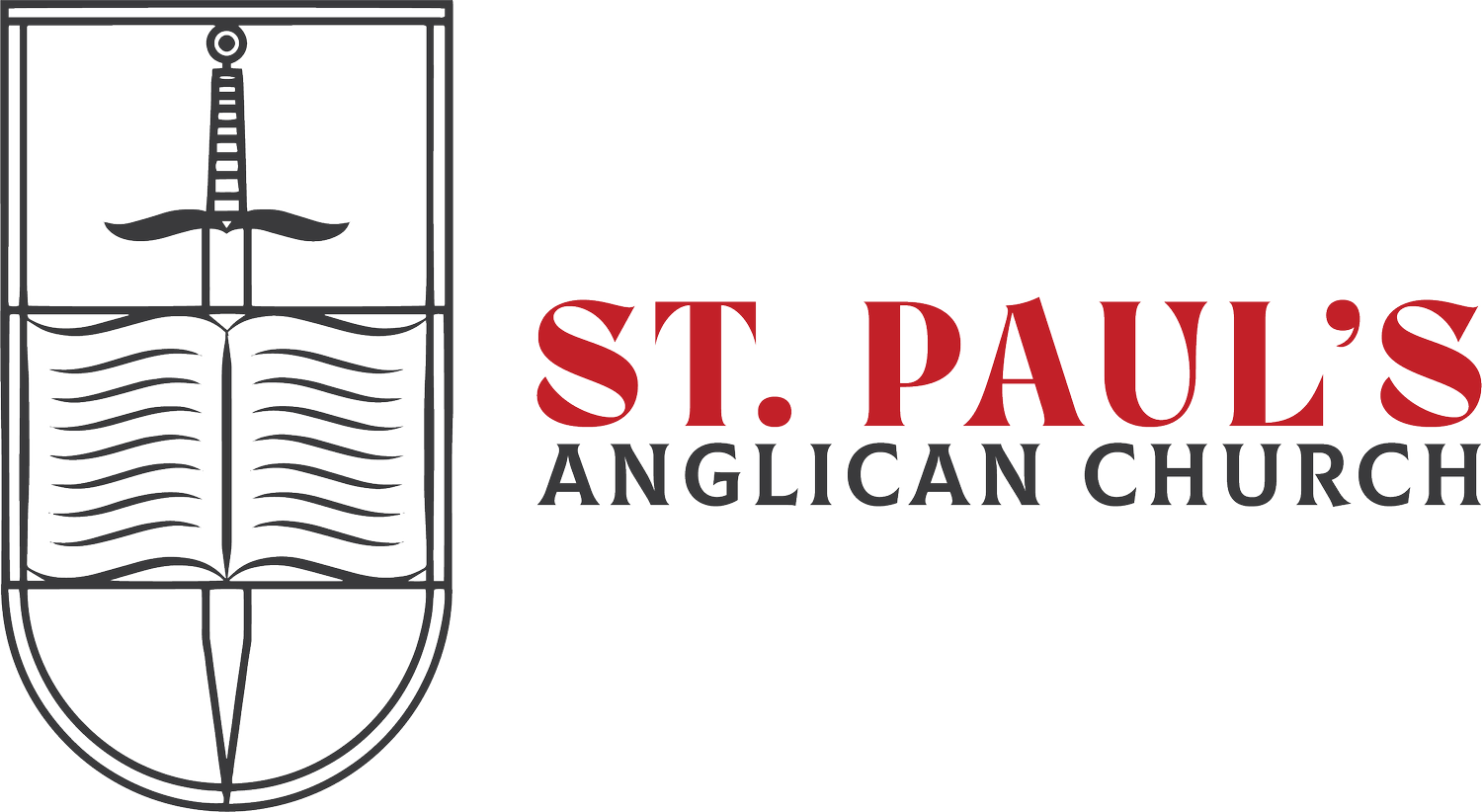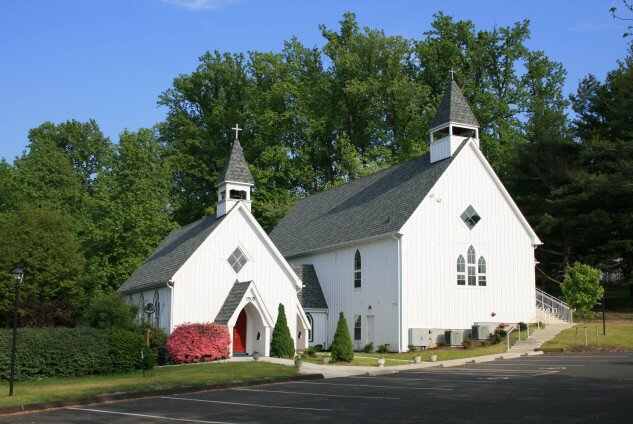
NEWS
Sunday School Building Clean Out: June 1 at 9:30a
We have been putting in a lot of work to turn our former Sunday School building into a space that we can use for different kinds of events. It’s almost ready but requires a little more work hauling out some of the old furniture. We are looking for some assistance, especially from younger men, in clearing it out on Saturday, June 1 at 9:30a after our Holy Communion service. We may even be lucky enough to have Fr. David make pancakes for those who come out!
Episcopal Visit: May 12, 2024
We were blessed to have Bishop Chandler Holder Jones, SSC at St. Paul’s on Sunday, May 12, 2024 for an episcopal visit. he performed a wedding, 14 confirmations, three receptions, and preached on the significance of the Feast of the Ascension and what it means for our faith! It was a busy few days at St. Paul’s, but a wonderful time.
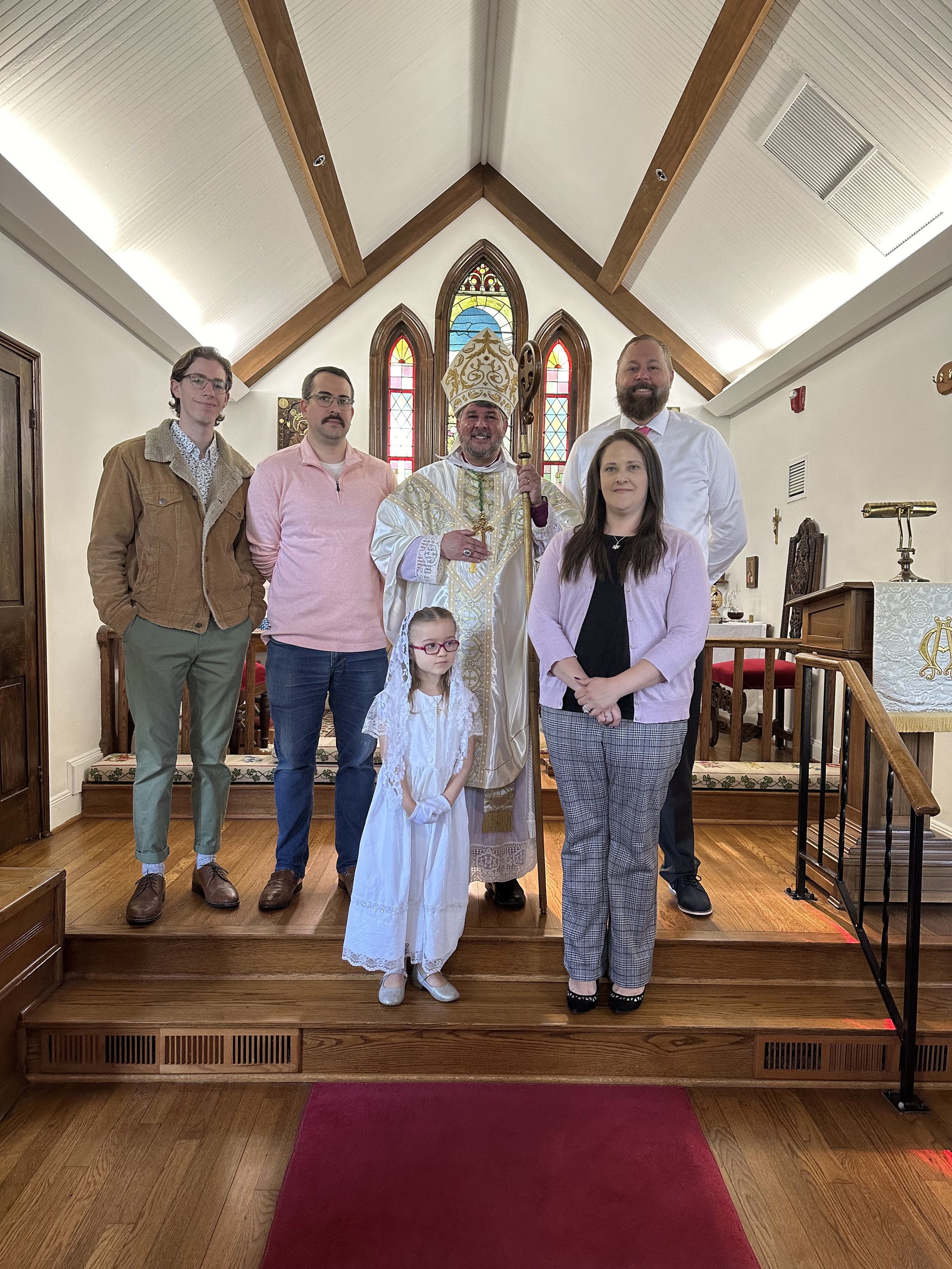
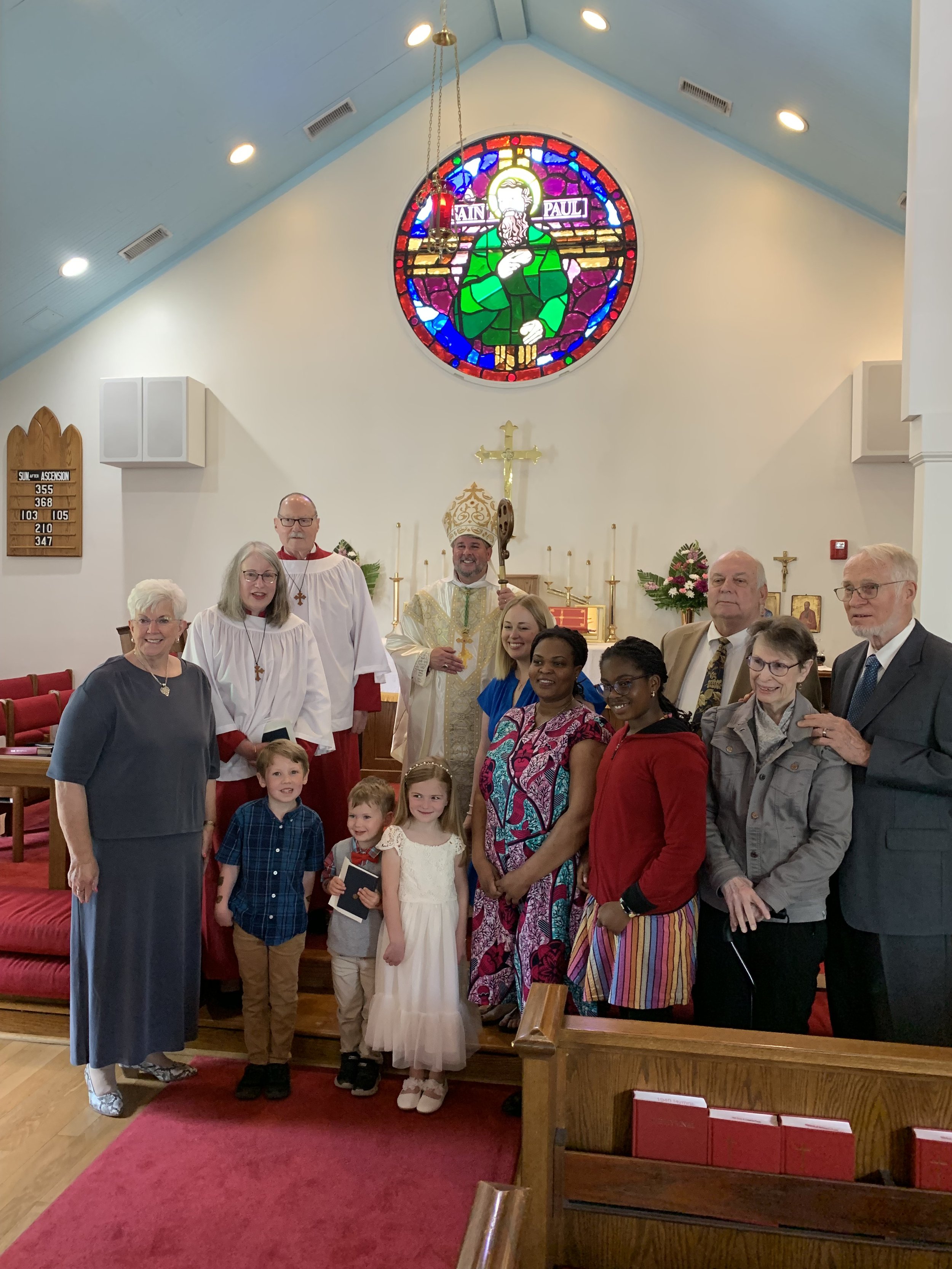

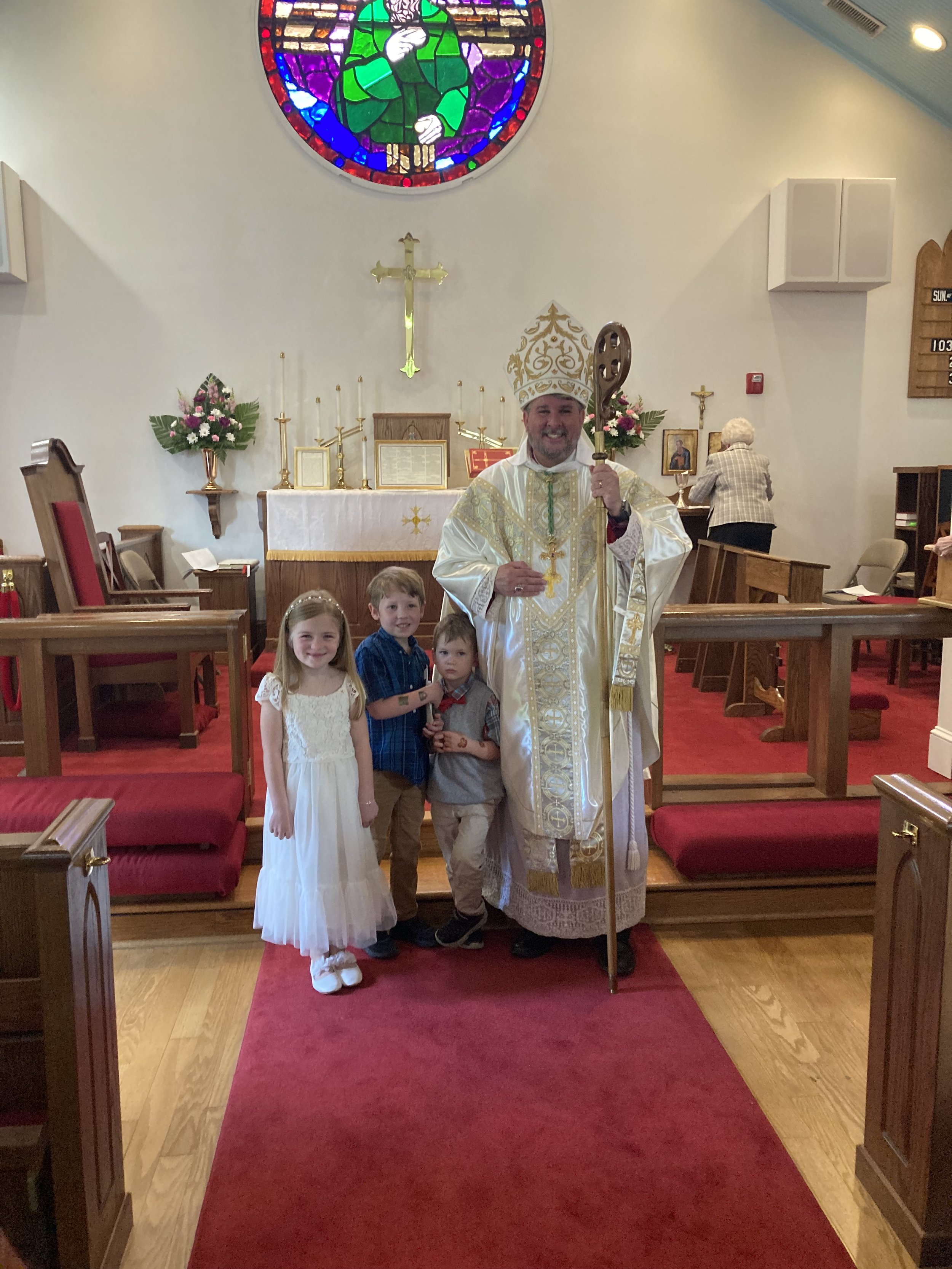
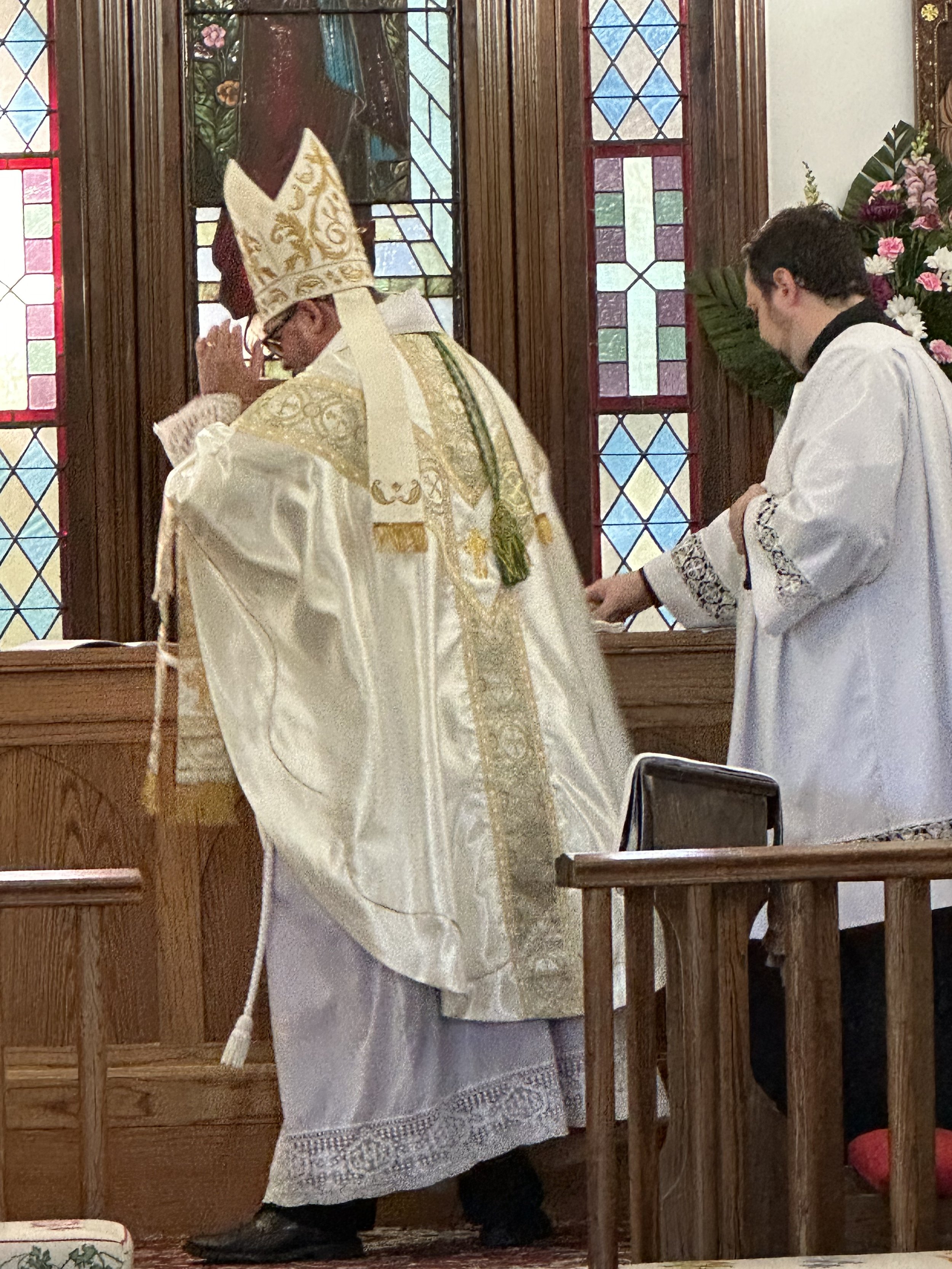
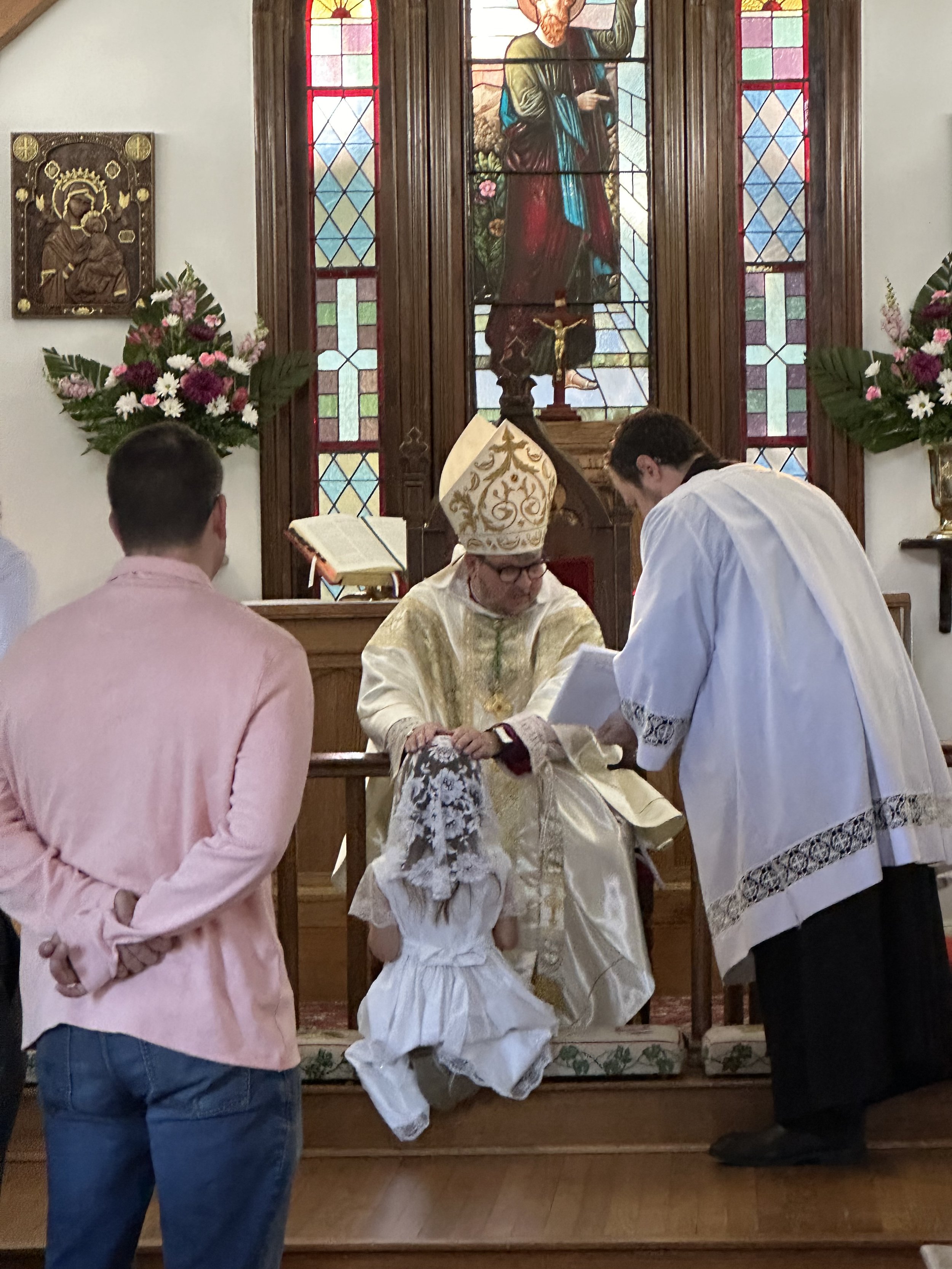
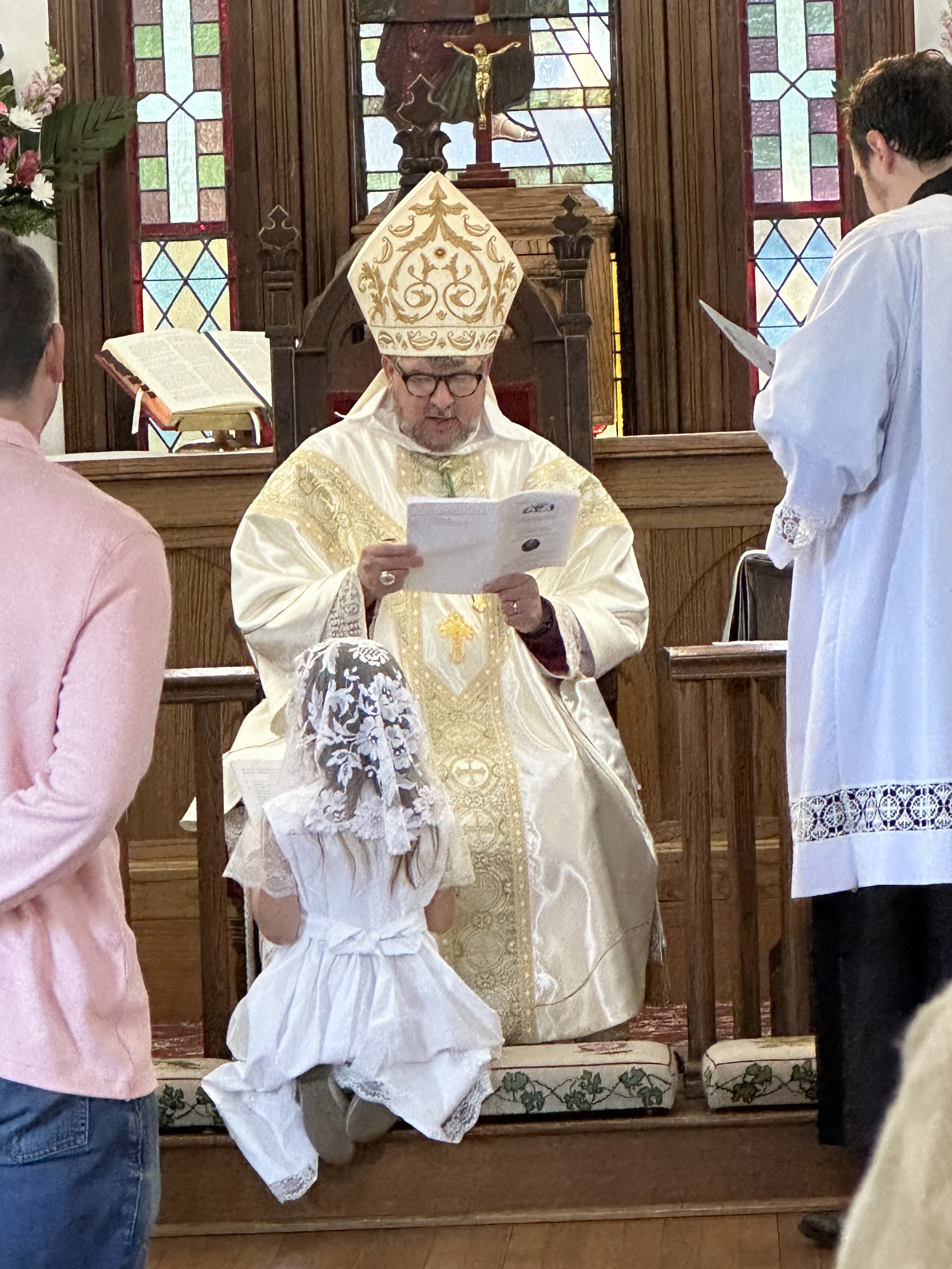

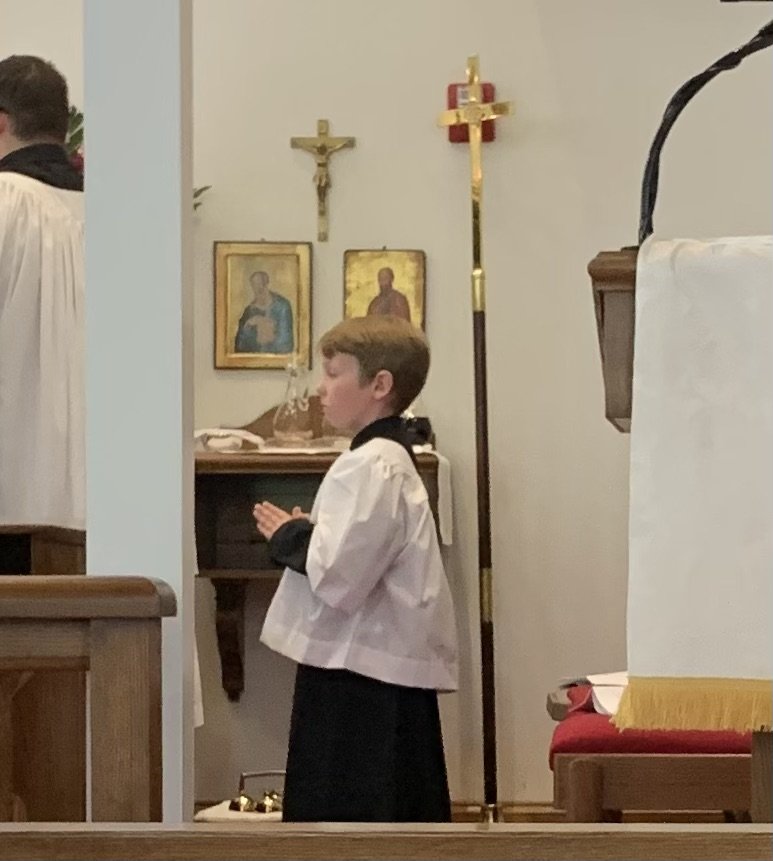
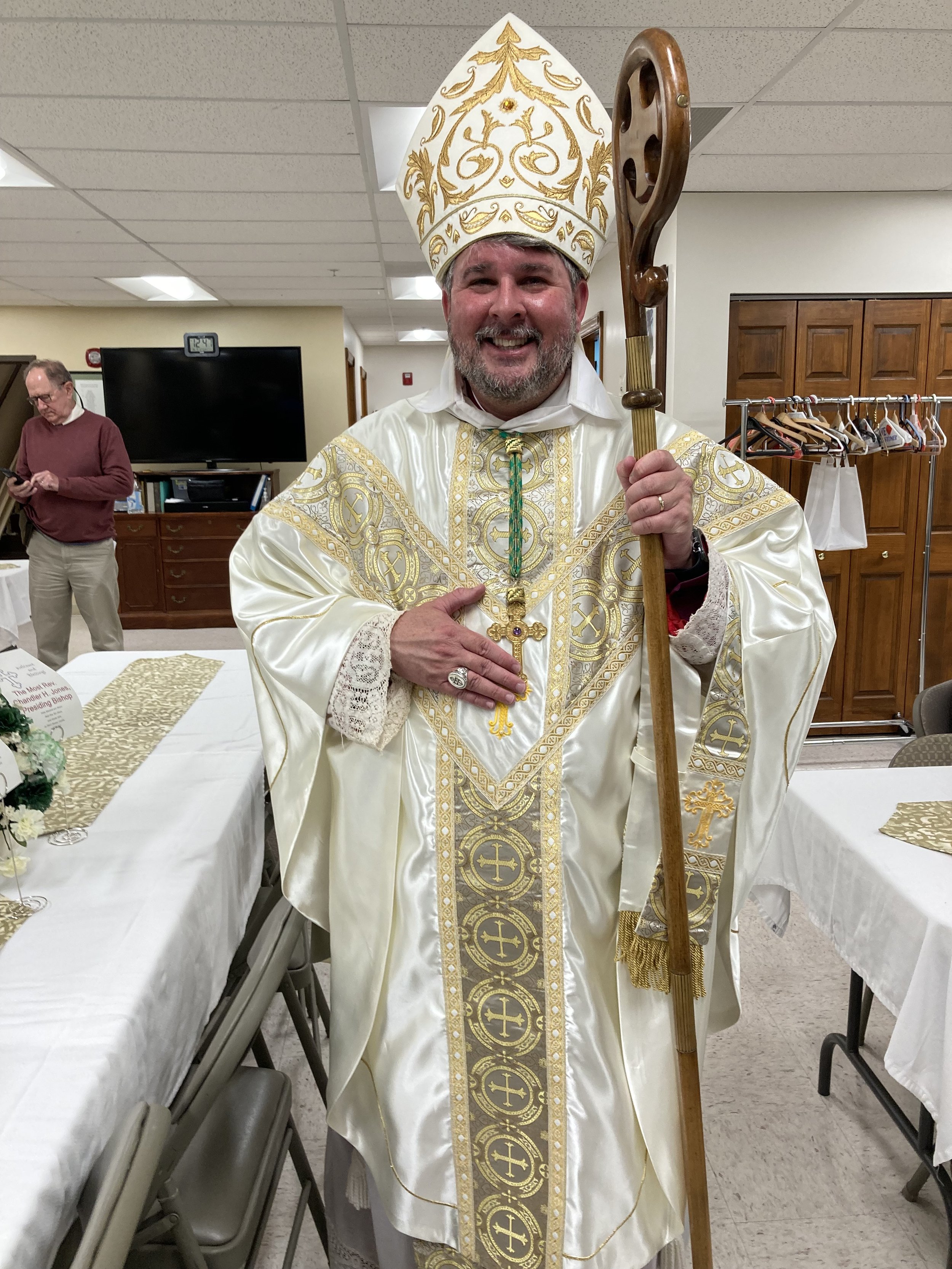
From the Rector’s Bookshelf: Images of Pilgrimage by R.D. Crouse
I love it when God brings things together in our lives. I’m sure you’ve experienced this too: you encounter an idea or saying somewhere and then that same thing reappears in a totally unrelated context later on. This has happened to me recently with the topic of pilgrimage. I like to read a devotional book alongside Morning Prayer most days. About a week and a half ago, I had finished my last book and decided to grab something new. The book that stood out to me from my bookshelf was called Images of Pilgrimage: Paradise and Wilderness in Christian Spirituality by R.D. Crouse. A few days after I began the book, I sat down to meditate on the readings for this past Sunday (Easter III) and was hit by the fact that the Epistle reading from I St. Peter 2:11ff. began with, “Dearly beloved, I beseech you as strangers and pilgrims, abstain from fleshly lusts, which war against the soul.” Clearly, God was trying to bring something about pilgrimage to my attention…hence the theme of the sermon!
Robert Crouse was a priest in the Anglican Church of Canada who was known for his contemplative teachings. He was an expert on Augustine and Dante and taught at King’s College in Halifax. He passed on in 2011. The book is short, only six chapters over 86 pages. It is composed of material he presented at a clergy retreat at St. Augustine’s Monastery in Nova Scotia in the 1990s.
The topic of the book is humanity as pilgrim. This is not a uniquely Christian idea because “these images [of pilgrimage] belong somehow to the essence of our humanity” (17). In fact, Crouse spends a chapter detailing the pagan image of pilgrimage and how they compare and contrast with the Christian conception. Homer’s Odyssey, the great Greek philosophers, and Virgil’s Aeneid make for fruitful inquiry into the theme of spiritual journey. Crouse isolates two aspects of the pilgrimage image present in these materials: odos, “the road that lies before us, the journey” and agon, “the hero’s struggle through a wilderness of one sort of another, to find a reconciliation, a paradise, which is eternal and divine” (19). Yet, the Greco-Romans held an ultimately hopeless view of life: “heroic virtue, heroic aspiration, is heroic hubris, and is destined for defeat. That is the worm at the heart of pagan spirituality: the endless cycles of aspiration and despair” (20).
This pagan view is radically different from what is presented to us in Scripture. In the creation poem of Genesis 1, we are taught that “all existence is in the Word of God. ‘He spake and it was done.’ All is divine utterance: ‘He commanded, and they were created.’ All things are in and by God’s word; there is nothing else there” (28). Further, humanity is placed in the Garden of Eden where the divine and human dwell together; it is all, very good. But, sadly, the story doesn’t end there because of the Fall. For Crouse, the Original Sin of Adam and Eve can be explained by the mystery of liberty. Any free will must be able to choose to obey or disobey; Adam and Eve used their will to disobey. Yet, even in this, God is still sovereign: “The serpent will wound, but the brazen serpent in the wilderness will heal. There can be nothing in creation which is not God’s, nothing unencompassed by his providence, nothing which falls outside his word and will. We cannot make, nor can we unmake, paradise; it is the fundamental reality of things, abiding in the word and will of God” (30). In Exodus, we see that the “wilderness,” the place of wandering, can be interpreted as both a blessing and a curse: a place without provision in which God provides for his people.
Our Lord’s ministry begins with his baptism, after which, he immediately retreats into the wilderness where he is tempted. In that story is a recapitulation of Adam and Old Testament Israel, except that Jesus does what they failed to do by obeying God. Disobedience caused ejection from paradise, but when Jesus obeyed, the angels came and ministered to him (Matt 4:11), turning wilderness into paradise. Similar patterns can be observed in the Feedings of the 5,000 and 4,000 and Pentecost. Ultimately, however, this rhythm of wilderness and paradise culminates in the Cross: “All this comes into focus with the Cross, which is at once the tree of utter desolation, and the tree of glory; the tree of death, and the tree of life” (43). These two poles of wilderness and paradise form the tension of “already” and “not yet”: the kingdom is within us, but the Son of Man has not yet come into his glory (44). For Crouse, we see this tension in the love of God that we experience and share amongst each other in the Church.
Two other places Crouse looks to expand on the image of pilgrimage via paradise and wilderness may be of interest to many: St. Augustine and Dante’s Divine Comedy. For Crouse, St. Augustine[1] advances the Christian conception of pilgrimage:
“The spirituality of St. Augustine is the spirituality of pilgrimage, and abounds in images of wilderness and paradise, of exile and repatriation. This theme runs through all his works, but perhaps it is most familiar and most accessible in the Confessions, his own ‘Odyssey of soul’, the story of his liberation from the futility of the social, educational and professional conventions of a dying age, from the ‘barren land’ he had made of himself, to find a new principle of thought and action in the paradise of the word of God” (54-55).
Dante’s Divine Comedy, a work we have been exploring this year at our Friday Study, is another model of pilgrimage: “Dante’s great poem presents itself on several levels: first of all, there are the great poetic images, Hell and Purgatory and Heaven, which specify major divisions of the work; but they are poetic images, and htepoem is not about those in any very direct way. I tis about the universal pilgrimage of humankind, pagan and Christian man, in this earthly life, and it speaks about the conditions and the terms and the end of the journey. But finally, it is about the poet’s own pilgrimage, the journey of his soul to God” (64-65).
What does Crouse’s exploration of Christian pilgrimage do for us? First and foremost, it helps us orient ourselves in light of rhythms of wilderness and paradise. When we understand the wilderness as a place of blessing and curse, we can conclude that “the trials of the wilderness are necessary, and must be embraced…Certainly in the wilderness — the confusions of the world in which we live, uncertainties within the Church, confusions within our own souls — certainly the wilderness presents us with problems and dilemmas, and it is surely not very easy to ‘count it all joy’. But that is precisely the nature of our calling, and, by the grace of God, who gives the Bread of Life in the wilderness, we are not without resources to do just that” (80-81). The fact that each and every one of us is on a pilgrimage through the wilderness of life that will hopefully bring us to Paradise brings the present more sharply into focus.
[1] The Feast of St. Augustine is May 5. Because that falls on a Sunday this year, it is relegated to a “commemoration”. The Feast of St. Monica, St. Augustine’s devout mother who prayed for his salvation during his years of prodigality, is always celebrated on May 4, the day before her son.
